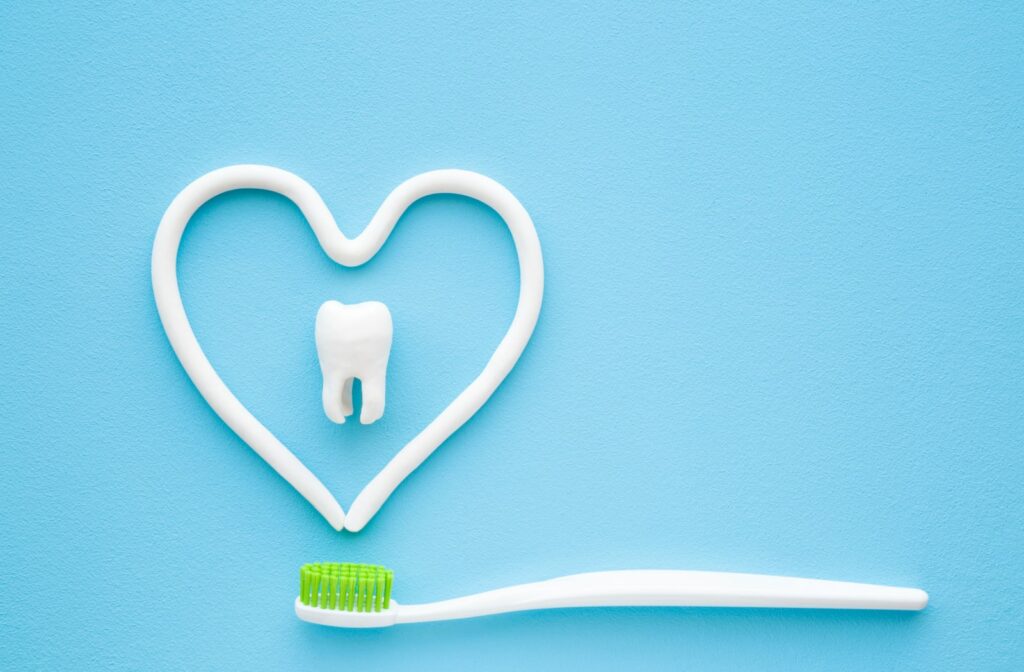You may already be aware of the importance of dental hygiene for a healthy smile, but did you know it can also impact your heart health? It sounds crazy, but a growing body of research suggests there may be a link between gum disease and heart disease.
Bacteria, chronic inflammation, and periodontal disease can impact your cardiovascular health. During your professional dental cleaning and check-up every 6 months, your dental team can assess your teeth and soft tissue for signs of inflammation.
One of the primary ways to avoid oral health problems is to visit your dentist and care for your teeth between appointments.
The Link Between Oral Health & Heart Disease
Periodontal Disease & Inflammation
Periodontal disease is a chronic condition that affects the tissues around your teeth, including the gums, ligaments, and bones that support them. The condition is caused by a buildup of plaque on your teeth that can cause inflammation and infection. If left untreated, periodontal disease can cause tooth loss and may even contribute to systemic inflammation throughout your body.
Unmanaged gum disease can also contribute to other health conditions, including:
- Osteoporosis
- Respiratory disease
- Rheumatoid arthritis
When this inflammation occurs in the blood vessels of your heart, it can lead to the development of different forms of heart disease, like:
- Coronary artery disease
- Clogged arteries
- Stroke
Bacteria
Your mouth is home to millions of bacteria, some of which can cause infections in other parts of your body. When you have periodontal disease, these bacteria can enter your bloodstream and travel to your heart, where they can cause inflammation and damage to your blood vessels.
One specific type of bacteria linked to gum disease and heart disease is called Porphyromonas gingivalis. It can produce enzymes that break down the proteins in your gums and can contribute to the development of systemic inflammation. This bacteria can also help form dangerous plaques in your blood vessels, increasing your risk of coronary artery disease and stroke.
Signs of Gum Disease
During your visit with your dental team, they’ll assess your mouth for common indications of gum disease, including:
- Swollen, bleeding, or receding gums
- Pus in the gums
- Bad breath (halitosis)
- Tenderness in the gums
- Buildup under the gumline
- Loose teeth
- Changes to your bite
Before your dentist makes a formal diagnosis of gum disease, they’ll perform tests alongside a visual exam, including:
- Measuring the gums and pocket depth
- Taking X-rays to examine the jawbone
- Examine sensitive teeth for signs of decay
Risk Factors for Gum Disease
While poor dental hygiene and periodontal disease are major contributors to the link between dental health and heart disease, other risk factors can contribute to both conditions.
Other risk factors for gum disease include:
- Missing dental cleanings
- Smoking
- Chronic stress
- Dry mouth
- Diabetes
- Hormonal changes
- Genetics
Periodontal disease has overlapping risk factors with coronary heart disease, clogged arteries, and stroke. Risk factors for cardiovascular disease include:
- Gum disease
- Diet high in trans fats, sodium, and added sugar
- Lack of exercise
- Chronic stress
- Obesity
- High blood pressure or cholesterol
- Diabetes
- Smoking
- Family history of heart disease
How to Prevent Gum Disease (& Possibly Heart Disease)
Fortunately, you can take steps to protect both your teeth and your heart. Some of the most effective ways to improve your dental health and help prevent gum disease include:
- Brushing and flossing regularly to remove plaque and bacteria from your teeth
- Using an antibacterial mouthwash to kill germs in your mouth
- Eating a healthy diet rich in vitamins and minerals
- Seeing your dentist regularly for cleanings and check-ups
To further protect your heart health, it’s essential to:
- Quit smoking
- Manage stress levels
- Exercise regularly
- Eat a heart-healthy diet low in sugar and saturated fats
Maintaining a healthy oral environment and seeing your dentist for preventive care can support your whole-body well-being.
Avoid Gum Disease with the Help of Your Dentist
Your oral health is interconnected with other areas of your body, so taking care of your teeth does more than prevent cavities and complicated dental procedures. Schedule an appointment at Hill Top Dental Centre for a cleaning and exam to get on track with your oral health and achieve a radiant smile.



